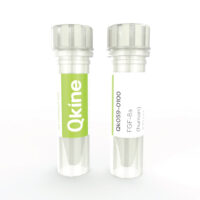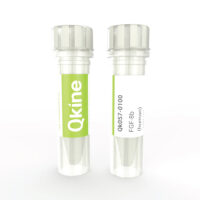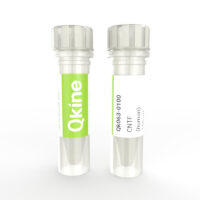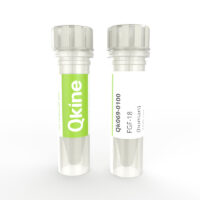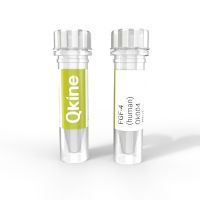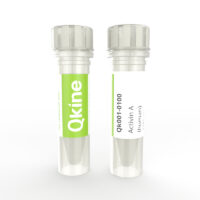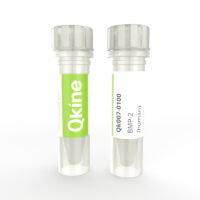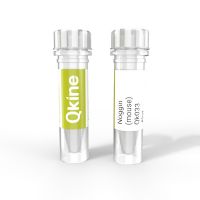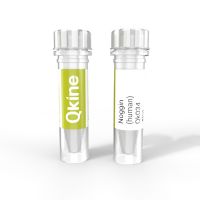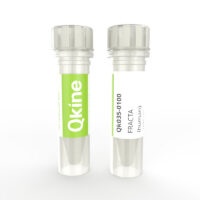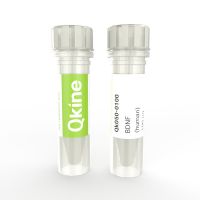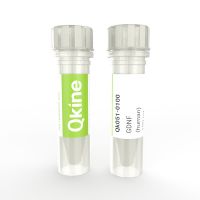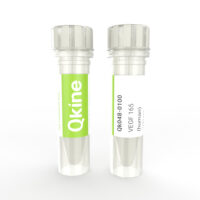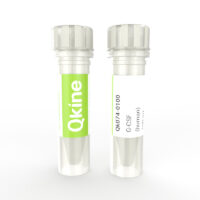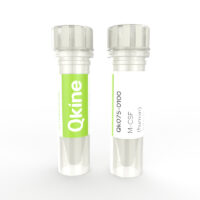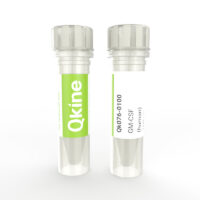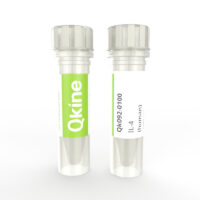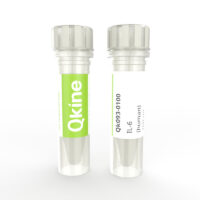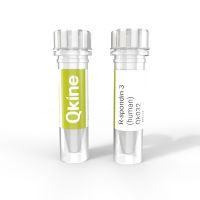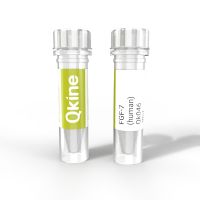- Fibroblast growth factor 8a (FGF-8a) is a member of the FGF family and plays a key role in the regulation of embryogenesis, cellular proliferation, differentiation, and migration. FGF8a is often used for the differentiation of induced pluripotent stem cells, embryonic stem cells, and neural stem cells.FGF8a is a spliced form of FGF8, a heparin-binding protein that targets mammary and non-mammary cells expressing the FGF receptors. A 21.3kDa highly pure, bioactive recombinant protein produced in an animal-free expression system. This protein is animal-origin free (AOF), carrier protein-free, tag-free, and non-glycosylated to ensure a pure homogenous protein with exceptional lot-to-lot consistency. Qk059 is suitable for enhanced reproducibility and physiologically relevant cultures.
- Fibroblast growth factor 8b (FGF-8b) is a member of the FGF family involved in the regulation of embryogenesis, cellular proliferation, differentiation, and migration.FGF8b is commonly used for the differentiation of induced pluripotent stem cells into neural cell types and brain organoid cultures.FGF8b is a spliced form of FGF8, a heparin-binding protein that targets mammary and non-mammary cells expressing the FGF receptors. A 22.5 kDa highly pure, bioactive recombinant protein produced in an animal-free expression system. This protein is carrier-free, tag-free and non-glycosylated to ensure a pure, homogenous protein with exceptional lot-to-lot consistency. Qk057 is suitable for enhanced reproducibility and physiologically relevant cultures.
- Ciliary Neurotrophic Factor (CNTF) is a member of the IL-6 family of cytokines. CNTF plays a crucial role in developing and maintaining the nervous system, in particular the optic nervous system. It promotes the maintenance, differentiation, and survival of various neurons, glial cells, and retinal cells.CNTF has been used in vitro to initiate neural induction and differentiation. CNTF can be used to culture primary neurons and glial cells such as astrocytes and Schwann cells. It is also used to culture retinal cells and adipocytes.Human CNTF has a molecular weight of 22.8 kDa. This protein is carrier-free, tag-free, and non-glycosylated to ensure its purity with exceptional lot-to-lot consistency. Qk063 is suitable for the culture of reproducible and high-quality neurons and other relevant cells.
- Fibroblast Growth Factor 18 (FGF-18), a member of the FGF family, characterized by its heparin-binding properties plays a significant role in regulating diverse biological processes such as embryonic development, skeletal and bone development, cartilage maintenance, angiogenesis and tissue repair.In cell culture, FGF18 is widely used to support cell culture maintenance and proliferation, promote chondrogenic and osteogenic differentiation of stem cells, stimulate angiogenesis, and enhance tissue regeneration.FGF-18 is a high purity truncated protein with a molecular weight of 20.2 kDa. This protein is carrier-free and tag-free to ensure its purity with exceptional lot-to-lot consistency. Qkine Fibroblast Growth Factor 18 is suitable for the culture of reproducible and high-quality stem cells, primary cells and other relevant cells.
- Human FGF-4 protein is used for the proliferation and differentiation of embryonic and induced-pluripotent and tissue (mesenchymal) stem cells and promotes neural stem cell proliferation. FGF-4 is an important component of cardiac, intestinal and other organoid culture media.High purity and bioactivity 14 kDa, bioactive domain of human fibroblast growth factor 4, animal origin free (AOF) and carrier-protein free.
- Activin A is a TGF-β family growth factor regulating embryonic development, cell proliferation, differentiation, and immune responses. Activin A is frequently used to maintain pluripotency in induced pluripotent and embryonic stem cell cultures. It is also used in many stem cell differentiation protocols, including endoderm lineage differentiation and further maturation into hepatocyte and pancreatic cells. Recombinant human/mouse/rat/bovine/porcine activin A protein is a high-purity mature bioactive dimer of 26 kDa. It is animal-free, carrier protein-free, and tag-free to ensure its purity with exceptional lot-to-lot consistency. This protein has been rigorously benchmarked against other commercial sources and extensively validated for highly reproducible stem cell culture. Qkine founder Marko Hyvönen developed the protocol for making high-purity activin A, and this protein is used at the Cambridge Stem Cell Institute. High purity mature bioactive dimer. Animal-free (AOF) and carrier-protein free (CF). Rigorously benchmarked against other commercial sources.
- Human/mouse/rat/bovine/porcine BMP-2 protein (bone morphogenetic protein 2) protein is member of the TGFβ family and a key regulator of embryogenesis and potent differentiation factor of embryonic stem cells (ESC) and induced pluripotent stem cells (iPSC) towards endoderm fates. BMP-2 plays roles in the differentiation of mesenchymal cells to adipocytes, epithelial cancer EMT, chondrogenesis and regulation of neuronal and glial cell development.26 kDa disulfide–linked bioactive highly pure dimer comprised of the mature domain of human BMP-2 protein. Animal-free (AOF) and carrier protein-free.
- Mouse/rat noggin is a bone morphogenetic protein (BMP) family antagonist used in the culture of intestinal, pancreatic, lung and tumor-derived organoids, maintenance of undifferentiated embryonic stem cells and for stem cell differentiation into neural and microglial lineages.Qkine recombinant mouse noggin protein is a highly pure 46kDa bioactive dimer for reproducible results (animal-free and carrier-protein free).
- Human noggin is a bone morphogenetic protein (BMP) family antagonist used in the culture of intestinal, pancreatic, lung and tumor-derived organoids, maintenance of undifferentiated embryonic stem cells and for stem cell differentiation into neural and microglial lineages.Qkine human noggin protein is a highly pure 46kDa bioactive dimer for reproducible results in organoid culture.
- Follistatin-resistant activin A protein (FRACTA) has been engineered to prevent binding to the natural inhibitor, follistatin. Activin A activity protein is regulated in vivo by follistatin, a high-affinity inhibitor; follistatin accumulates in stem cell culture, where it inhibits activin A.Qk035 follistatin-resistant activin A protein (FRACTA) has equivalent bioactivity to wild-type activin A (Qk001) but does not bind follistatin so is resistant to feedback inhibition. High purity 26 kDa dimer comprising engineered mature domain of activin A protein, animal-free (AF) and carrier-protein free (CF). This specialised activin A has been developed in Marko Hyvönen’s group in the University of Cambridge.
- Brain-derived neurotrophic factor (BDNF) is a member of neurotrophin family and plays a crucial role in neural development, maintenance, and function. It stimulates neurogenesis and is also a major regulator of synaptic plasticity and neuroprotection. It is used to maintain neurons and differentiate and mature human pluripotent stem cell-derived neural progenitors to cortical and motor neurons and cortical organoids.Recombinant human BDNF protein has a molecular weight of 14 kDa. This protein is animal-free, carrier-free, tag-free, and non-glycosylated to ensure its purity with exceptional lot-to-lot consistency. Qk050 is suitable for the culture of reproducible and high-quality cortical and motor neurons and cortical organoids.
- Glial cell line-derived neurotrophic factor (GDNF) is a member of neurotrophin family and GDNF family of ligands (GFL). GDNF plays a crucial role in the development, growth, and survival of neurons in particular midbrain dopaminergic neurons. It promotes the axon growth and innervation of dopamine neurons. GNDF is used to maintain neurons and cortical organoids and to differentiate dopaminergic neurons from human pluripotent stem cell-derived neural progenitors. GDNF also facilitates the differentiation of neural progenitors to astrocytes.Recombinant human GDNF bioactive 30 kDa homodimer. This protein is animal-free (AOF), carrier protein-free, and tag-free to ensure its purity with exceptional lot-to-lot consistency. Qk051 is suitable for the culture of reproducible and high-quality cortical and motor neurons and cortical organoids.
- Recombinant human vascular endothelial growth factor 165 (also known as VEGF165/ VEGF-165/ VEGF-A/ VEGF165) protein is widely used in culturing primary endothelial cells, such as human umbilical vein endothelial cells.VEGF165 is commonly used with human-induced pluripotent stem cells or embryonic stem cells-derived endothelial cells for developing human vascular tissue models. It has many applications including its use in neural research involving oligodendrocyte precursor cells, Schwann cells, astrocytes, and microglia. It plays a role in bone formation, regulates mesenchymal stem cell differentiation, and serves as a survival factor for chondrocytes, hematopoietic stem cells, and tumor cells.Qkine recombinant human VEGF165 protein is a highly pure and potent 38 kDa homodimer, disulfide-linked consisting of two 165 amino acid polypeptide chains. It is an animal origin free (AOF) and carrier protein-free (CF) isoform of VEGF for high efficiency.
- Granulocyte colony-stimulating factor (G-CSF) is a member of the hematopoietic growth factor family which plays a crucial role in the proliferation, differentiation, and maturation of committed progenitor cells to granulocytes, such as neutrophils. G-CSF is produced by various cell types including macrophages, fibroblasts, and endothelial cells. It binds to the G-CSF surface receptors upon stimulation to activate key cellular processes involved in neutrophil proliferation, maturation, and mobilization in healthy and diseased states.G-CSF is commonly used in vitro to maintain neutrophils and stimulate the differentiation of cells to neutrophil lineage. is a highly pure, bioactive glycoprotein produced in an animal-free expression system composed of 174 amino acids with a molecular weight of 18.6 kDa. Human and murine G-CSF are 73% identical at the amino acid level and show species cross-reactivity. Human G-CSF is carrier-free, tag-free, and non-glycosylated to ensure a pure and homogenous production of high-quality neutrophils and other relevant cell cultures with exceptional lot-to-lot consistency.
- Macrophage colony-stimulating factor (M-CSF) is a cytokine that regulates the survival, proliferation, differentiation, and functional activation of monocytes, such as macrophages and dendritic cells. Various cells produce and release M-CSF, such as endothelial cells, fibroblasts, osteoblasts, smooth muscle, and macrophages. M-CSF binds to the CSF-1 receptor (CSF-1R) leading to the activation of the PI3K-AKT and AMPK signaling.M-CSF has been used in vitro for the differentiation of human induced pluripotent stem cell (iPSC)-derived macrophages as well as the maintenance and development of monocytes in hematopoietic stem cell culture. M-CSF has also been used to influence macrophage polarization towards an anti-inflammatory or M2 macrophage phenotype.A highly bioactive, animal-origin-free (AOF), carrier protein-free 36.8 kDa recombinant protein with exceptional lot-to-lot consistency.
- Granulocyte-macrophage colony-stimulating factor (GM-CSF) is a hematopoietic growth factor involved in the differentiation and activation of monocytes such as macrophages and dendritic cells, and granulocytes such as neutrophils, eosinophils, and basophils. It is also involved in the development of erythroid, megakaryocytes, and keratinocytes. GM-CSF binds to the GM-CSF receptor (CSF2R) and activates the JAK2/ STAT-5, Ras/ ERK, NF-kB, and PI3K pathways.It is commonly used in cell culture to stimulate the differentiation and maturation of human-induced pluripotent stem cells or peripheral blood monocytes to myeloid cells. GM-CSF can also increase the glycolytic activity of macrophages and promote an M1 polarization.Human GM-CSF is composed of 144 amino acids with a molecular weight of 14.6 kDa. This protein is animal-free, carrier protein-free, tag-free, and non-glycosylated to ensure a homogenous population with exceptional lot-to-lot consistency. Qk076 is suitable for reproducible and high-quality neutrophils and other relevant cell cultures.
- Interleukin-4 (IL-4) is a pleiotropic, immune-modulatory cytokine that is secreted primarily by mast cells, T-cells, eosinophils, and basophils. IL-4 plays a crucial role in hematopoiesis, the regulation of antibody production, the stimulation of activated B cell and T cell proliferation, and the differentiation of B cells into plasma cellsIL-4 induces the expression of class II MHC molecules on resting B-cells and aids regulation of the low-affinity Fc receptor for IgE (CD23) expression on lymphocytes and monocytes. IL-4 additionally is a key regulator in adaptive immunity.Human IL-4 has a molecular weight of 15.1 kDa. This protein is carrier-free and tag-free to ensure its purity with exceptional lot-to-lot consistency. Qk092 is suitable for the culture of reproducible and high-quality stem cells and other relevant cells.
- Interleukin-6 (IL-6) is a multifunctional cytokine that regulates immune responses and inflammation. It is produced by various cells, including immune cells such as T cells and macrophages, as well as non-immune cells like fibroblasts and endothelial cells. IL-6 plays a critical role in infection defense and tissue damage by promoting inflammation and activating immune cells. IL-6 is involved in various physiological processes, including the regulation of metabolism, tissue repair, and hematopoiesis. Human IL-6 has a molecular weight of 20.9 kDa. This protein is carrier-free and tag-free to ensure its purity with exceptional lot-to-lot consistency. Interleukin-6 is suitable for the culture of reproducible and high-quality hematopoietic stem cells and other relevant cells.
- Human R-spondin 3 protein potentiates Wnt signalling in and has been shown to function in crypt regeneration in the intestine and control stem cell and progenitor cell behaviour during kidney development. R-spondin 3 is used alongside R-spondin 1 in intestinal organoid culture systems.17kDa highly pure, bioactive domain of human R-spondin 3 comprising the two cysteine-rich furin-like domains, which are necessary and sufficient for Wnt signalling potentiation and are the essential domains for activity in stem cell and organoid culture. Animal-free and carrier-protein free.
- Human KGF protein (FGF-7) is a member of the FGF family secreted by mesenchymal cells and has a paracrine effect on neighbouring epithelial cells.1 KGF protein is used in the culture of lung, breast, liver, and bladder organoids.2 In vivo, KGF is involved in wound healing and development of kidney, thymus, and hippocampus.1High purity and bioactivity 19 kDa human FGF-7 / KGF protein, animal-origin free (AOF) and carrier-protein free (CF).
